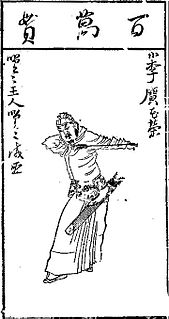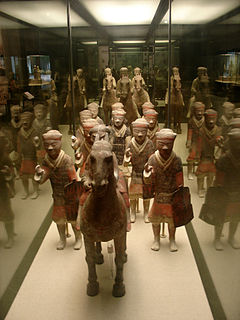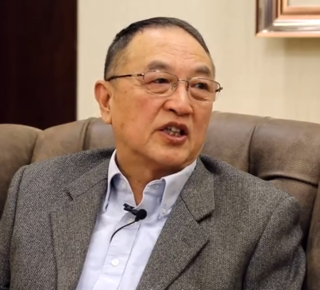External links
1. Company Website
2. Google Finance Page
3. Reuters Finance Page
4. Zhongjin, Shandong Gold compete for two gold companies
5. Asian Fab 50 Entry on Forbes
| Industry | Mining, non-ferrous metals |
|---|---|
| Headquarters | , |
Area served | China and foreign countries |
Key people | Zhaoxue Sun (Chairman of the Board), Yueqing Li (Secretary of the Board, Jinding Wang (General Manager) |
| Products | Non-ferrous metals including gold, copper, and platinum |
| 3.3 billion yuan | |
| Total assets | 8.0 billion yuan |
Zhongjin Gold is a Chinese mining corporation mainly focusing on non-ferrous metals, such as gold, copper, and platinum. The corporation is based in Beijing, and holds mines in across China. They recently acquired two large gold production companies in Shandong, after winning a bidding war against Shandong Gold. The company's largest single gold mine in the Dazhuohan mine, producing 500,000 metric tonnes concentrate a year. They are currently traded on the Shanghai Stock Exchange as "Company 600489", and are listed on Forbes "Asia's Fab 50" list in 2011.
Chairman- Xin Song
Directors- Xin Song, Congsheng Liu, Bing Liu, Haiqing Du
General Manager- Jinding Wang
Secretary of the Board- Yueqing Li
Deputy General Managers- Nailin Zhang, Ruixiang Wang, Weihua Qu
1. Company Website
2. Google Finance Page
3. Reuters Finance Page
4. Zhongjin, Shandong Gold compete for two gold companies
5. Asian Fab 50 Entry on Forbes

劉 / 刘 is an East Asian surname. pinyin: Liú in Mandarin Chinese, Lau4 in Cantonese. It is the family name of the Han dynasty emperors. The character 劉 originally meant 'kill', but is now used only as a surname. It is listed 252nd in the classic text Hundred Family Surnames. Today, it is the 4th most common surname in Mainland China as well as one of the most common surnames in the world.

Wang Mang, courtesy name Jujun, was the founder and the only emperor of the short-lived Chinese Xin dynasty. He was originally an official and consort kin of the Han dynasty and later seized the throne in AD 9. The Han dynasty was restored after his overthrow, and his rule marked the separation between the Western Han dynasty and Eastern Han dynasty. Traditional Chinese historiography viewed Wang as a tyrant and usurper, while more recently, some historians have portrayed him as a visionary and selfless social reformer. During his reign, he abolished slavery and initiated a land redistribution program. Though a learned Confucian scholar who sought to implement the harmonious society he saw in the classics, his efforts ended in chaos.

The Chu–Han Contention or Chu–Han War (楚漢戰爭) was an interregnum period in ancient China between the fallen Qin dynasty and the subsequent Han dynasty. After the third and last Qin ruler, Ziying, unconditionally surrendered to rebel forces in 206 BCE, the former Qin Empire was divided by rebel leader Xiang Yu into the Eighteen Kingdoms, which were ruled by various rebel leaders and surrendered Qin generals. A civil war soon broke out, most prominently between two major contending powers – Xiang Yu's Western Chu and Liu Bang's Han. Some of the other kingdoms also waged war among themselves but these were largely insignificant compared to the main conflict between Chu and Han. The war ended in 202 BCE with a total Han victory at the Battle of Gaixia, where Xiang Yu fled to Wujiang and committed suicide after a violent last stand. Liu Bang subsequently proclaimed himself Emperor and established the Han dynasty as the ruling dynasty of China.

Hua Rong is a fictional character in Water Margin, one of the Four Great Classical Novels of Chinese literature. Nicknamed "Little Li Guang", he ranks ninth among the 36 Heavenly Spirits, the first third of the 108 Stars of Destiny.
Huang Xin is a fictional character in Water Margin, one of the Four Great Classical Novels in Chinese literature. Nicknamed "Guardian of the Three Mountains", he ranks 38th among the 108 Stars of Destiny and second among the 72 Earthly Fiends.
Yan Shun is a fictional character in Water Margin, one of the Four Great Classical Novels of Chinese literature. Nicknamed "Multicoloured Tiger", he ranks 50th among the 108 Stars of Destiny and 14th among the 72 Earthly Fiends.

Shandong Taishan Football Club is a professional football club that currently participates in the Chinese Super League under licence from the Chinese Football Association (CFA). The team is based in Jinan, Shandong and their home stadium is the Jinan Olympic Sports Center Stadium that has a seating capacity of 56,808. Their current majority shareholder is Shandong Electric Power Group Corporation, the biggest supplier of electric energy in Shandong province and itself part of the State Grid Corporation of China. "Luneng" is the name of Luneng Group, now another subsidiary corporation of State Grid Corporation of China; Lu is a nickname for Shandong, from the ancient state of Lu, while neng means "energy." The last part of the club name derives from Mount Tai.

The Red Eyebrows was one of the two major peasant rebellion movements against Wang Mang's short-lived Xin dynasty, the other being Lülin. It was so named because the rebels painted their eyebrows red.

Liu Chuanzhi is a Chinese entrepreneur. Liu is the founder of Lenovo, the world's largest personal computer vendor by unit sales. He remains one of the leaders of the company.

Jiangxi Copper is the largest copper producer in Mainland China. Its operations include copper mining, milling, smelting and refining to produce copper-related products, including pyrite concentrates, sulfuric acid and electrolytic gold and silver. Its chairman is Mr. Li Yuhuang and its headquarters is at Guixi, Jiangxi, China.

The China women's national volleyball team represents the People's Republic of China in international volleyball competitions and friendly matches governed by Chinese Volleyball Association. They are one of the leading and most successful squads in women's international volleyball, having won ten championships titles in the three major international competitions of volleyball, including five World Cups, two World Championships and three Olympic titles. The current head coach is Cai Bin.

The 11th National Games of China were held in various cities in Shandong from October 16 to October 28, 2009. Represented were 33 sports, 43 disciplines and 362 events, including 4 winter sports which were held in Shenyang, Changchun and Qingdao between January and April 2009.
Shenzhen Zhongjin Lingnan Nonfemet Co., Ltd. known as Zhongjin Lingnan in China or their English name Nonfemet, is a Chinese company engaged in the mining and processing of lead, zinc and other non-ferrous metals. In 2015 financial year, the company also had 0.49% revenue from real estate development.
TOSHIBA 2013 Chinese FA Cup is the 15th edition of Chinese FA Cup. The match of first round was kicked off on 31 March 2013, and finished on 7 December 2013.
Shandong Gold Group is a state-owned Chinese gold mining company under the provincial government of Shandong. The company is the second-largest producer of gold in China by output and its publicly-listed subsidiary ranked #1,898 in the Forbes Global 2000.

Qingdao Jiaodong International Airport is an airport serving the city of Qingdao in Shandong province, China. It received approval in December 2013, and replaced Qingdao Liuting International Airport as the city's main airport. It is located in Jiaodong, Jiaozhou, 39 kilometres (24 mi) from the center of Qingdao. The airport opened on 12 August 2021 and is currently the largest airport in Shandong, capable of handling 35 million passengers annually.
This is a list of state-owned enterprises of China. A state-owned enterprise is a legal entity that undertakes commercial activities on behalf of an owner government. Their legal status varies from being a part of government to stock companies with a state as a regular or dominant stockholder. There is no standard definition of a government-owned corporation (GOC) or state-owned enterprise (SOE), although the two terms are often used interchangeably. The defining characteristics are that they have a distinct legal shape and they are established to operate in commercial affairs. While they may also have public policy objectives, SOEs should be differentiated from other forms of government agencies or state entities that are established to pursue purely non-financial objectives. The role of the Chinese Communist Party (CCP) in SOEs has varied at different periods but has increased during the rule of CCP General Secretary Xi Jinping, with the Party formally taking a commanding role in all SOEs as of 2020. For example, Lai Xiaomin, the former president of China Huarong Asset Management, which is a famous state-owned enterprise, announced in 2015 that during the operation of China Huarong Asset Management, the Committee of China Communist Party will play a central role, and party members will play an exemplary role.

Yuehua Entertainment is a privately held Chinese multinational entertainment group and talent agency based in Beijing. The company was founded in June 2009 by former Huayi Brothers employee Du Hua. Yuehua is involved in television production and distribution, movie production, artist management and training, music and music video production, public relations, and entertainment marketing. Yuehua Entertainment has partnerships with the South Korean companies Pledis Entertainment, Starship Entertainment, and SM Entertainment.

The China men's national volleyball team represents China in international volleyball competitions and friendly matches, governed by Chinese Volleyball Association. The team competed twice in the Olympic Games, finishing in eighth place at the 1984 Summer Olympics in Los Angeles, California, and fifth place in the 2008 Summer Olympics at home in Beijing. China have been consistently competing the FIVB World Championship, with a best of seventh place in both 1978 and 1982. On a continental level, China won three gold medals at the Asian Games, in 1986, 1990 and 1998. China also won 3 gold medals at the Asian Championship in 1979, 1997 and 1999. The team now ranks 25th in the FIVB World Rankings and the current head coach is Wu Sheng.